- Home
- Cynthia Voigt
Tree by Leaf Page 9
Tree by Leaf Read online
Page 9
They were young to be driving, Clothilde thought. They looked alike, although one was a stocky redhead with freckles and the other a dark-haired young man. They looked alike because they both looked as if they were glad to be themselves, and as if they were about to laugh out loud. They looked alike because under the short car jackets, they both wore bright white trousers with crisp pleats and shoes that were as brightly polished as the automobile.
“The one person we wanted to see,” the red-haired driver greeted Polly. He didn’t even see Clothilde. “Alex? Fetch the charts out, will you? No, honestly, Polly, I said so to Alex, before we even pushed the starter button. He’ll testify, won’t you, Alex? I said to him that if we didn’t find Polly Dethier at home, the whole trip would be wasted. Didn’t I, Alex?”
“Or words to that effect.”
“Alex, you are as stuffy as your grandfather,” the redhead laughed. “Words to that effect,” he mimicked his friend’s voice. “It must be all that old money, you were born with your shirt already stuffed. Whatever he says, Polly, it’s true that the only reason I came was to see you.”
“You—you’re teasing,” Polly said. She stood quietly, looking down at the ground the way a young lady should. It was Clothilde who was staring.
“It had nothing whatsoever to do with a chance to take the Olds out for a spin,” the dark-haired boy explained.
Polly was smiling at the ground, and her dimple showed. Clothilde decided to leave, but Polly reached out and held her elbow, holding her there.
“That’s right,” the redhead laughed. “You’re the only reason, Polly.”
“You’re trying to make me vain,” Polly answered.
“Pretty girls ought to be vain,” he said, and she shook her head at him, and wentttch as if she were scolding him. “Nate went off,” he said, “and left his boat at our dock, with orders for us to return it. We need someone to show us exactly where, on this uninhabitable coast, we should take it. He also gave us a message to deliver.”
Polly raised her head at that, and Clothilde saw an expression in her blue eyes that she couldn’t name, something bright and happy, with nothing kept hidden. “Is it that I have to read the charts for you in order to hear my message?” Polly asked. Eager—happy and eager, that’s what her eyes were.
“Now that would be ungentlemanly of us. Practically blackmail.”
“Are you setting up as a gentleman now?” Polly asked. “My, my, I am impressed.”
“She’s got you properly pegged, Bobby,” Alex said, coming back from the car with a nautical chart, which he spread out on the ground. Clothilde looked at it: it was a chart of the bay, she saw; she recognized Speer Point’s mitten shape.Mine, she thought, with a smile she didn’t let show, as she looked down at the chart.
“Inscrutable, isn’t it?” the dark-haired boy said, looking at her.
“No,” Clothilde answered.
He laughed at that, as if she had meant to be funny. “Who is this gracious young person?” he asked Polly. “Aren’t you going to introduce us?”
“This is Nate’s sister, Clothilde. Clothilde—meet Alex and Bobby.”
“You’re some of Nates friends?” Clothilde had never met any of her brothers school friends. She felt differently about them, if they were friends of Nate’s.
“We’re more than that, Miss Speer. We are his great friends,” Alex said, bowing his head at her.
“One for all, and all for one,” Alex added.
“Waiting only for D’Artagnan,” Bobby added.
Clothilde didn’t know what they were talking about but she knew what they meant. “David and Jonathan,” she said, to show them that she could show off too.
Alex looked at her; he hadn’t looked at her before. “One hopes it won’t come to that,” he said. “You are sharp as a tack, aren’t you?”
Sharper, Clothilde said to herself, but she didn’t say it out loud. Neither did she stick out her tongue at him, even though she was tempted. She just looked right back at him.
“What are you talking about?” Polly demanded, claiming their attention. “Bobby, what are they talking about?”
“Your guess is as good as mine,” Bobby laughed. Being sharp as a tack wasn’t what they thought she ought to be, Clothilde thought; and she didn’t give two hoots for what they thought.
“What we need,” Alex said, “is someone to show us on the chart where we take Nate’s boat. He gave us strict orders, didn’t he, Bobby?”
“He did indeed. It was most unlike him. He was quite severe with us. We shall not, for one, take it around the Point to the boathouse, where we might be seen from the cottage. The beautiful reclusive mama, you know, shut away in her grief. I don’t mean to be flippant,” he apologized to Clothilde. “I mean, I think it’s pretty wonderful all that loyalty to the dead hero. I do, it’s just the way I always talk.”
Clothilde didn’t know what to say. Polly didn’t say anything either.
“So we’re supposed to leave it off in the cove on the north side. There’s a mooring,” Alex explained to Polly.
“But we shall not, for the second point, make ourselves known to the tenant farmer’s family,” Bobby said. “As if I needed warning about that. The natives—with certain most attractive exceptions—are as foreign as aborigines to me. According to Nate, if we could execute this maneuver in the dead of night, under cover of dense fog, that would suit everyone best. It’s like some spy drama, isn’t it?” His laugh invited them to join in.
“So, if you’d show us where we’ll find the mooring?” Alex asked Clothilde.
She hunkered down beside the chart and put her finger on the cove by the beach. Alex took a gold pencil out of his pocket to mark the place“How about rocks, and tides?”
“Except for the dead low tide there’s enough water in the cove,” she told him, without looking up from the chart. On a chart the mittened hand held onto its place by digging its claws into the water. “If you stay away from shore there’s nothing to worry about.”
“That’s fine then. Thanks,” he said. She got up, and picked up the wrapped chicken. He studied the chart. “It is a nice bit of property, Speer Point. I’ve never noticed how large it is.”
Bobby stepped over to look down at the chart. “My father says it’s worth a pretty penny already. When the old lady bought it, it was too far away for most people. Nobody would have guessed then how its value would rise, with the automobile making everything easier to get to. You could put half a dozen large estates on it, couldn’t you?”
“Your father is a lunatic about land development,” Alex said, folding the chart and getting up.
“He knows how to make money,” Bobby agreed. “He actually—and he was at least half serious—made Nate an offer for it at one point. But Nates too smart to sell now. He told Father he was planning to hold onto the Point and let its value continue to rise.”
“Nate said that?” Clothilde asked, too amazed to keep her mouth shut.
“Now that it’s his, now that your father—” Bobby started to say, then let the words drift away. “I’m sorry, I shouldn’t sound so callous, and him a hero, too. It sounds like I don’t have any patriotic feelings.”
“I’ve got to go,” Clothilde said, into the center of the group, not looking at any of them.
“May we give you a ride?” Alex offered. “It’s not one of your Speer Electrics, but you might find the added power exhilarating.”
“No,” Clothilde said. “I’d rather walk.”
“Whatever you prefer,” Bobby said, not even waiting before he said to Polly, “And about the message we were entrusted with, to deliver it to you.”
“A message?” Polly asked. Polly’s voice sounded as if she’d forgotten the message, but her eyes lit up again.
Clothilde turned and walked away, but she listened to the voices behind her. “Nate says, we’re to take you back into town with us, and buy you a soda. Or a sundae if you’d prefer that.”
“Oh he does, doe
s he?” Polly’s voice had hesitated before it answered.
“With the permission of your formidable mother, of course,” Bobby said.
Clothilde walked out of earshot, down through the village and up the hill beyond. It wasn’t until she had passed the Twoheys’ farm that she let herself start thinking.
The lies Nate had been telling—all those lies, and why had he been telling them? The friends he’d been making, if those were his friends.
Fog swirled in around her again. The temperature fell, but she didn’t notice it, walking hard. Those two boys, and Nate too, she could see the world they lived in, sunlit and easy, an amusing place. Not like Jeb Twohey’s world, the land that lay behind his blank face and dazed eyes. And Polly—Polly loved Nate. Clothilde suddenly knew that. And she knew that that was what Nate wanted Polly to do, or that was what Polly thought he wanted. The expression in Polly’s eyes, that bright painful expression, was hope.
Clothilde didn’t know why she was suddenly seeing into peoples’ heads like this. She wished she wouldn’t. She liked it better when she didn’t think she knew what people thought or wanted, or were afraid of or were hoping for. When she had crossed the causeway to stand on her own land again, she stopped for a minute, to let her spirit ease.Mine, she thought, with the shrouded birches beside her and the rocks behind falling away into the invisible water. Mine, the dirt road underfoot. It was there under her feet, deep and steady, the whole peninsula.
Nate was truly gone, then, off on his cruise. She worked it out as she followed the road back home. Since Nate was off, it had in fact been a dream. It had been the strangest dream she’d ever had, and probably ever would have, but she could guess why she had had it; hoping that something would stop what was happening. But Nate was gone, off cruising, and the man in the boathouse wouldn’t get better. He’d always have that face as long as he lived. Lou wouldn’t find any way to get away from her father, either. She’d be stuck with having him hurt her, and having to give her family the money she earned because her father spent his lawless earnings on whiskey for himself, and nobody could stop him.
On the other hand, Clothilde thought, that might mean that the peninsula was going to stay hers after all. The Yes’s in her dream turned into No’s, so the No had to turn into a Yes. Maybe. Because it was hers, she could feel it being hers, with every step she took on it, in the woods or on the beach, and on the headlands especially.
Chapter 9
That evening, Clothilde sat in the parlor unstitching the cloak. What a long day it had been, she thought, although she couldn’t think why the day had seemed so long. Yesterday seemed like a hundred years gone. The minutes of this Monday had lined up like the hundreds and thousands of tiny stitches along the seams of the cloak. There were so many stitches she couldn’t count the ones behind her, or ahead of her, as if there was no end and no beginning to them. That was the way this day felt to her.
That thought didn’t make her unhappy. In fact, Clothilde was feeling content. The red parlor curtains were pulled closed against the weather. Warmth spread out from the pot-bellied stove. Deep reds and blues were braided in concentric circles to make the rag rug. The lamplight fell warm on her hands. Lou had put Dierdre to bed and was finishing up the kitchen. Clothilde picked out stitch after stitch. Now the cloak would be a farewell gift for Lou. The wool, cleverly cut, would make a warm dress, the lining would make two good blouses. As her hands worked, separating the long seams, she reminded herself that two fine pieces of cloth were better than nothing, as a gift. Across from her, Mother’s head was bent over a square of silk, onto which she was embroidering red and yellow flowers. The threads gleamed in the lamplight, and Mother’s hair shone.
They were a houseful of women now. There was something peaceful about that idea. Boys, men, were forever going out and doing things, disturbing the quiet with the demands of their important businesses. Girls, women, stayed home, performing their small tasks. Even if the whole world crumbled around them, or fell away from beneath them, they worked patiently away. On a night like this, Clothilde thought, she didn’t envy Nate his cruise, the new places, the adventure. A slow, foggy rain fell through the darkness outside. She was glad not to be out in this night.
Oddly, she remembered that strange dream. Really, it was a wonderful dream to have had, especially the way of seeing things that happened at the end of her dream. Such colors and shapes—each leaf on every branch of all the trees. It was like being in a magic land, where everything was more perfectly itself. She smiled to herself. She kept forgetting it and then for some reason remembering. Maybe she remembered now because she was sitting quiet, like some wild animal in its den, like a rabbit snug in its hole. She wondered if it was possible to see people in that magical way—and then thought of Jeb Twohey, and the black fog that swirled around inside his head, and how it was as if he himself were huddled in there, like a rabbit waiting in the darkness of its burrow. It was Jeb Twohey who needed dreams like the one she’d had. She could just imagine what his dreams were like, poor soul. Her dream, now—and it wasn’t just trees, it was the rocks too, it was everything she had looked at; remembering, Clothilde smiled.
“It’s lovely, isn’t it?” Mother asked.
Recalled from her own thoughts, Clothilde didn’t understand at first what her mother was asking. Instead of looking at the needlework Mother had spread out over her lap, she looked at her mother, at the oval face under a dark cloud of hair, at eyes the blue of a summer sky, which shone there like the sunlit sky. Mother was prettier even than Polly Dethier—by far. Mother was waiting, holding up the work now for Clothilde’s approval. In her eyes, Clothilde saw how much Mother wanted Clothilde to approve. “What?” Clothilde asked.
“It wasn’t anything,” Mother lay the piece down, her eyes clouded.
“It is lovely,” Clothilde finally understood. “It’s very pretty. I don’t see how you get such fine stitches,” she said, knowing that was what Mother wanted to hear.
“I had good teachers,” Mother explained, cheered. Her hands smoothed the fabric. Her fingers traced the stitched flowers. “I always liked pretty things. And flowers, too. The shop where I worked sold flowers.”
“You worked in a shop? You worked in a flower shop? You never told me.”
“It was before I married, so—everything changed when I married.”
“Why did you work in a shop?” Clothilde hadn’t known Mother could surprise her.
“We had to support ourselves,” Mother said. “The orphanage couldn’t take care of us all our lives. The woman who owned the shop—Mrs. Peters, Mrs. Mary Peters—she was a widow and a good churchgoer. She liked orphanage girls. I was fortunate to have that employment offered to me. She had no children of her own. She gave me my own room, in her apartment over the shop, and I’d never had my own room before.”
Clothilde couldn’t imagine it. She had never thought about her mother’s life. She had a hundred questions she wanted to ask. She wondered what wages Mother had earned and what it had been like to work behind the counter, serving customers. She wondered what kinds of customers there had been and if it had been in a city, a city store. She had never thought her mother could be a shopgirl. “What kind of work did you do?” she asked.
Mother shook her head. She didn’t want to answer. Why didn’t she want to answer? Before Clothilde could ask again, there was a knock at the door.
The sound seemed to boom through the quiet house. Clothilde stared at her mother: She couldn’t begin to think of who it might be, unless it might be the man from the boathouse. She didn’t want to answer the door. But Mother wasn’t getting up either. They never had visitors at night, or during the day either. The knocking at the door—which was repeated now, more loudly—sent the quiet flying out of the house.
“Louisa?” Mother called. “Answer the door.”
Clothilde wanted to protest, to say Lou was busy and she could see who was there, but she didn’t know who it could be and she didn’t want to be the
first to find out. From her chair, she watched Lou hurry to the door and step back, opening it.
A man stood there, dressed in yellow oilskins. He took off his jacket and shook the water off it before he would step into the hallway. It was Tom Hatch.
Tom Hatch stood inside the door with his jacket in his hand. He wore high black rubber boots and the waterproof trousers were held up by wide suspenders. “Is Mrs. Speer in?” he asked Lou.
“Yuh, they’re in the parlor.”
“It’s Tom Hatch,” Clothilde told her mother. Her mother’s large eyes looked even larger; she too was surprised and anxious at this visit.
Her voice, however, sounded calm. “Come in, Mr. Hatch.”
He came no farther than the door, so he wouldn’t drip onto the rug. What news had brought him out, Clothilde wondered. She didn’t think she wanted to hear it, but she wished he would hurry and speak, to get it over with. Tom Hatch wore a heavy sweater and he was fumbling in the trouser pockets, under his oilskin pants.
“It’s a bad night to be out in,” Mother said.
“It’ll do,” Tom Hatch answered. “I’m here because—this came for you.” He reached over to hand Mother a yellow envelope, a telegram. “Mr. Grindle didn’t know but what you should have it right away. They sent it over from the Western Union office in town, but the delivery boy didn’t want to risk the road out here, in this weather and at night.”
Mother held the envelope in her hand. “I thank you for your trouble.”
“It was no trouble. When a man has no family, it’s no trouble for him to go out of an evening. Besides, I thought I’d tell Lou—” he turned then, to look at Lou’s pale face—“There’s no news, no sign. We went out as far as we could before the fog started coming in too thick. I thought you might be wondering.”

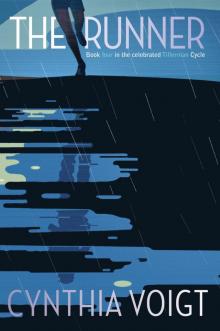 The Runner
The Runner By Any Name
By Any Name Bad Girls, Bad Girls, Whatcha Gonna Do?
Bad Girls, Bad Girls, Whatcha Gonna Do?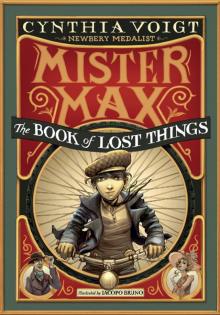 Mister Max: The Book of Lost Things: Mister Max 1
Mister Max: The Book of Lost Things: Mister Max 1 The Wings of a Falcon
The Wings of a Falcon Bad Girls in Love
Bad Girls in Love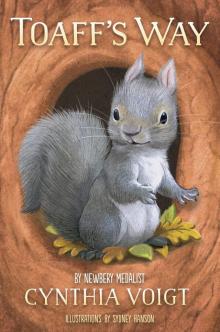 Toaff's Way
Toaff's Way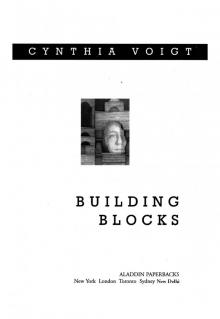 Building Blocks
Building Blocks Orfe
Orfe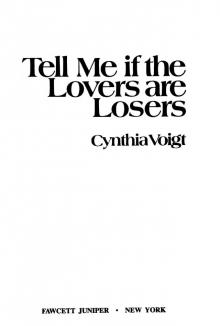 Tell Me if the Lovers Are Losers
Tell Me if the Lovers Are Losers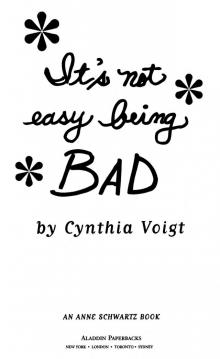 It's Not Easy Being Bad
It's Not Easy Being Bad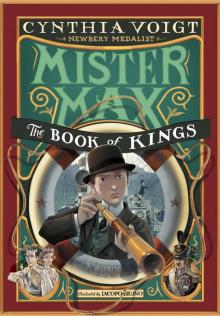 The Book of Kings
The Book of Kings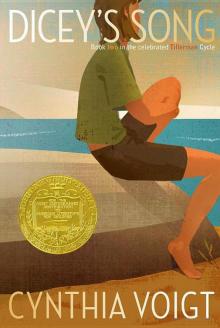 Dicey's Song
Dicey's Song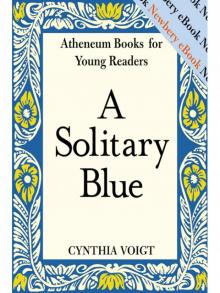 A Solitary Blue
A Solitary Blue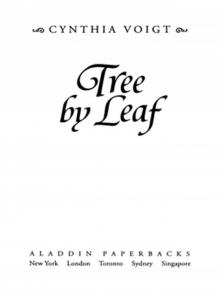 Tree by Leaf
Tree by Leaf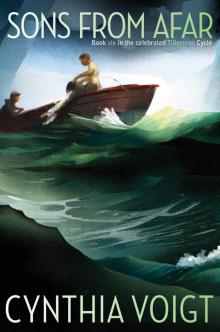 Sons From Afar
Sons From Afar Teddy & Co.
Teddy & Co. Jackaroo
Jackaroo Elske
Elske Izzy, Willy-Nilly
Izzy, Willy-Nilly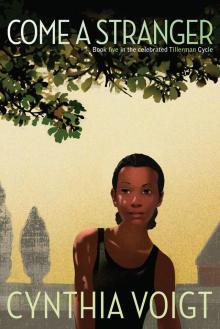 Come a Stranger
Come a Stranger Mister Max: The Book of Secrets: Mister Max 2
Mister Max: The Book of Secrets: Mister Max 2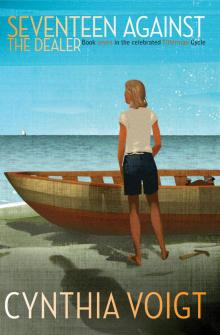 Seventeen Against the Dealer
Seventeen Against the Dealer The Callender Papers
The Callender Papers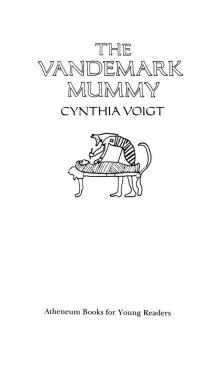 The Vandemark Mummy
The Vandemark Mummy Tale of Birle
Tale of Birle Glass Mountain
Glass Mountain The Tale of Oriel
The Tale of Oriel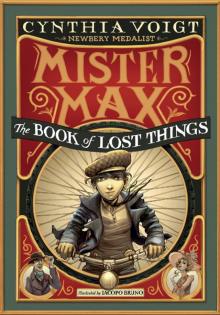 The Book of Lost Things
The Book of Lost Things The Book of Secrets
The Book of Secrets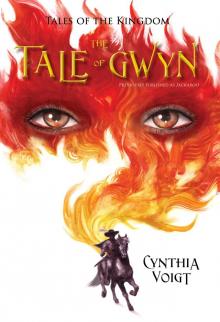 Tale of Gwyn
Tale of Gwyn